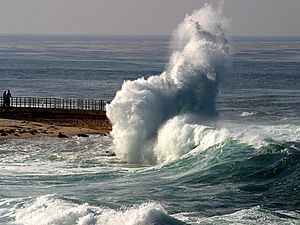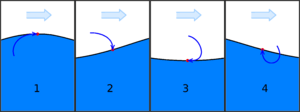Ocean surface wave facts for kids

Ocean waves are movements of water on the surface of the ocean. They are usually caused by wind. Sometimes, big events like earthquakes or volcanoes can also create them.
These waves can travel thousands of miles across the ocean. They only stop when they hit land. Waves come in many sizes. They can be tiny ripples or giant tsunamis.
Even though waves carry a lot of energy, the water itself doesn't move forward much. Imagine a floating toy duck. It bobs up and down as a wave passes, but it doesn't travel with the wave.
How Ocean Waves Form
Most of the big waves you see at the beach are "wind waves." This means they are created by wind blowing over the ocean. Three main things help make these waves bigger:
- Wind speed: How fast the wind is blowing.
- Fetch: The distance of open water the wind blows over.
- Duration: How long the wind blows over that area.
All these factors work together. The stronger the wind, the longer it blows, and the more open water it covers, the larger the waves will be.
Measuring Waves
Scientists measure waves in a few ways:
- Height: This is the distance from the lowest part (the trough) to the highest part (the crest).
- Wavelength: This is the distance from one wave crest to the next wave crest.
- Period: This is the time it takes for two wave crests to pass the same spot.
Waves in one area are usually not all the same size. For weather reports, scientists often talk about "significant wave height." This is the average height of the tallest one-third of the waves over a certain time. The very biggest waves can be about twice this "significant wave height."
Images for kids
-
NOAA ship Delaware II in bad weather on Georges Bank
-
A photo showing how water particles move under a surface gravity wave in a wave tank.
See also
 In Spanish: Ola para niños
In Spanish: Ola para niños












